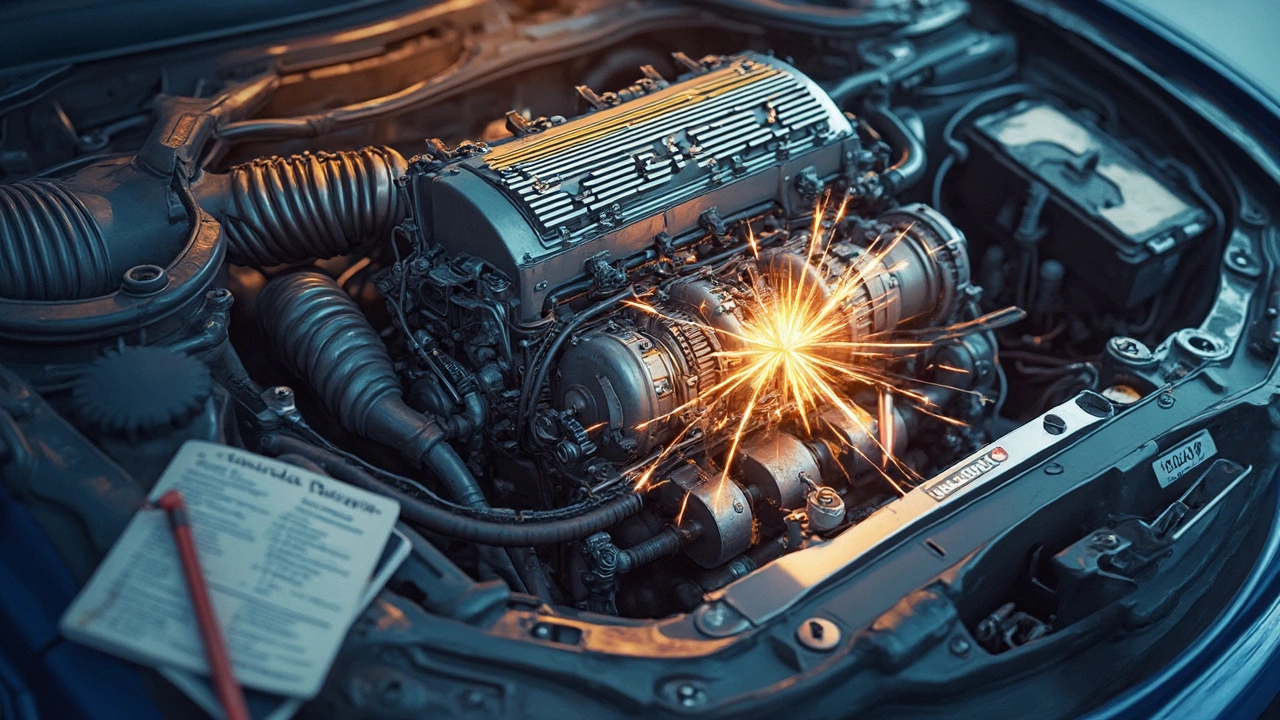Fuel pumps, huh? They're the unsung heroes of our cars, tirelessly working to send fuel from the tank to the engine. When they fail, it's like the car has suddenly had enough and decides to quit the job altogether. But ever wonder what makes a perfectly good fuel pump just give up? A lot of it boils down to what they're dealing with, like dirty fuel, grime-filled filters, or even electrical gremlins. So, how does one keep their fuel pump happy? Knowing what to look out for is a good start.
First off, picture this: You're driving and your car hesitates, like it's suddenly not sure if it wants to keep going. That's a red flag—a sign pointing right at your fuel pump. Often, it's something avoidable that led to this moment. Fuel pumps are quite tough, but they're not invincible, especially if they're chugging down less than stellar fuel.
Let's not forget about those tiny, unnoticed components that can cause big havoc—fuel filters. When clogged, they put extra stress on the pump, like making it breathe through a straw. Keeping these clean is like giving your car a breath of fresh air, literally. On top of that, electrical issues are a sure way to sour a fuel pump's day, cutting off its power supply and leaving your engine gasping for more.
- Understanding Fuel Pumps
- Symptoms of a Failing Fuel Pump
- Common Causes of Fuel Pump Failure
- The Impact of Dirty Fuel Filters
- Electrical Problems and Their Effects
- Tips for Prolonging Fuel Pump Life
Understanding Fuel Pumps
So, what's the big deal about fuel pumps anyway? Well, they’re the ones making sure your car isn't just sitting pretty in your driveway. These nifty devices are responsible for moving fuel from your tank to the engine, ensuring that your car runs smoothly. Imagine trying to suck a thick milkshake through a straw—without a good fuel pump, that's basically what your engine has to do to get fuel.
Modern fuel pumps are usually electric, especially in cars that have fuel injection systems. Older cars might have mechanical pumps, but these are becoming rare birds. Electric pumps are generally located inside the fuel tank, which keeps them cool and often quiet since they’re immersed in fuel. No one wants a screechy car ride, right?
One fascinating tidbit—did you know the average fuel pump lasts about 100,000 to 150,000 miles? Of course, that's just an average, and how well you maintain it can hugely affect its lifespan. Keep things running smoothly, and you could even surpass that estimate!
"A well-maintained fuel pump can save car owners from unnecessary headaches and costly repairs," says automotive expert Jessica White from the Motorist’s Journal.
There are three main types of fuel pumps used in cars today:
- Electrical pumps: Found in modern vehicles, they efficiently deliver high-pressure fuel needed for fuel-injected engines.
- Mechanical pumps: Older models often used these, and they rely on the engine’s movements to push fuel.
- Turbine pumps: These provide a more even flow, making them a popular choice for cars that demand consistent performance.
Understanding these basics helps you appreciate what’s ticking under your hood. By taking simple steps—like using high-quality fuel and not running too low on petrol—you'll keep that fuel pump working like a champ.
Symptoms of a Failing Fuel Pump
When your fuel pump starts acting up, your car won’t be shy about showing signs, and they're usually pretty clear. So, what do these symptoms look like? One of the most common signs is when the engine begins to sputter at high speeds. Imagine cruising smoothly and suddenly, the engine feels like it's stumbling—this can be a telltale sign your fuel pump is struggling.
Another classic symptom is trouble starting the car. If you notice it takes more than one twist of the key, it could be the fuel pump isn't delivering enough pressure. This lack of pressure means the engine doesn’t get the fuel it needs to start smoothly.
Pay attention to power loss, especially when going uphill or under load. This scenario is akin to trying to sprint up a hill with a blocked straw for air—your car needs more fuel, and the pump can't keep up.
Not to be overlooked is fuel pump noise. If you notice a whining sound coming from the fuel tank, that's often the pump begging for help. Sometimes, it’s just working overtime to get fuel through a clogged filter.
And don’t forget about the check engine light. It's not always a deceptive drama queen—if yours lights up alongside these symptoms, it's probably time to have the fuel system checked.
Here's a quick go-to checklist:
- Engine sputtering at high speeds
- Difficulty starting
- Loss of power when accelerating or climbing
- Unusual whining noise from the fuel tank
- Check engine light is on
Knowing these symptoms can save a lot of hassle down the road. When in doubt, it's best to have a mechanic check it out. After all, dealing with vehicle repairs when they’re small is usually a lot easier than when they spiral into bigger dramas.
Common Causes of Fuel Pump Failure
So, what exactly makes a fuel pump decide it's had enough? Well, there are a few usual suspects that tend to pop up when diagnosing the issue. Understanding these can save you from an unexpected breakdown or a costly repair bill.
First up, dirty fuel. It’s like feeding your pump a diet of fast food—it’s not going to end well. Contaminated fuel can wear out the pump quickly, causing it to clog or corrode. Regularly using high-quality fuel can make a noticeable difference, keeping your pump working smoothly for longer.
Next, let's chat about fuel filters. These little guys are crucial because they trap dirt and debris before it reaches the pump. But once they’re clogged, it’s like asking your pump to run a marathon with no air. Replacing these filters at recommended intervals ensures your fuel system remains debris-free.
Temperature can also be a killer. Fuel pumps keep cool by being submerged in fuel, and if you’re constantly running on empty, there’s less fuel available for cooling. This leads to overheating and eventual failure. Keeping your tank at least a quarter full helps maintain the ideal temperature for your pump.
Ever considered the electrical side of things? Electrical issues like bad connections or a faulty wire can cut off power to your fuel pump, leaving your engine starved for fuel. Ensuring your vehicle's wiring is in tip-top condition is key to avoiding these hiccups.
- Contaminated or low-quality fuel: Give your pump the clean energy it deserves.
- Clogged fuel filters: Routine checks help catch blockages early.
- Running too low on fuel: Don’t let your tank run dry; it's not worth the risk.
- Electrical issues: Faulty connections can leave your pump powerless.

The Impact of Dirty Fuel Filters
So you've got this handy little device called a fuel filter, and it's like the bouncer for your fuel pump. It's there to keep all the gunk out so only the cleanest fuel makes its way to the engine. But what if this filter gets all clogged up? That's when the trouble starts.
Imagine your fuel pump trying to suck fuel through a clogged straw. It's working way harder than it needs to, and eventually, this extra effort starts to take a toll. A fuel pump can overheat or wear out faster when it's pushed too hard by a blocked filter. Suddenly, your car is having problems you didn't see coming, all because a filter got a bit too dirty.
Now, how does a filter even get so filthy? Think about all the dirt and debris that can slide into your fuel tank, like rust from the tank itself or particles from the fuel. Over time, these accumulate and the filter struggles to do its job, leading to a restricted fuel flow. That's why checking and replacing them regularly is crucial.
Here's a little tip: keep a schedule for changing out that filter. Most experts suggest doing this every 20,000 to 30,000 miles, but it's always good to check your car's manual for specifics. Doing so makes sure that your fuel pump isn't working overtime, which means less wear and tear.
Regular maintenance and keeping an eye on this seemingly small part can save you from that dreaded moment when your car refuses to start. Plus, it's much cheaper and easier to swap out a filter than to fix an entire fuel pump system. Think about it like this—keeping that filter clean is just smart car care. It's kind of a win-win for both you and your vehicle repairs.
Electrical Problems and Their Effects
Alright, let's chat about electrical gremlins and what they do to a fuel pump. It's like when your phone suddenly decides to not charge—frustrating, right? The same kind of agony applies to your vehicle when the electrical setup is on the fritz.
Fuel pumps rely on their connection to the car's electrical system to keep running. Sometimes, though, mischief creeps in through things like poor wiring, faulty relays, or even a dead battery. Without consistent power, the fuel pump can't function smoothly, leaving your engine starved.
If you're wondering what happens when wires go haywire, it's usually because they've worn out over the years or because of shoddy connections. Pictured the mess of tangled cables behind your TV? It’s similar in cars if someone didn’t set things right initially. Vehicle repairs often involve checking these snakes of wires for issues.
"Electrical issues can cause fuel pumps to underperform, leading to significant engine problems down the line," explains auto mechanic expert Mike Simmons. "Regular checks can prevent major headaches."
Then there are relays, the piece of the puzzle that passes the electrical flow to the pump. They’re small, but when they fail, it's as if the pump loses the 'go' signal. That’s why it's essential to keep an eye on the relays, especially in older vehicles.
Now, let's look at batteries—a silent player in this drama. If your car battery isn't holding its juice, the fuel pump might find itself starved of the power it needs, making your morning commute a tad unpredictable.
Here's a quick lowdown on what to check regularly to avoid electrical issues:
- Check the wiring: Look for frayed or exposed wires that can lead to shorts.
- Inspect relays: Ensure they’re in good shape and functioning correctly.
- Test the battery: Once in a while, just make sure it’s holding charge like it should.
- Listen out for unusual sounds: Sometimes, the first clue something’s off electrically comes from the noises under your hood.
So, staying on top of these preventive checks can not only extend the life of your fuel pump but also save you from getting stuck on the roadside, waiting for a tow.
Tips for Prolonging Fuel Pump Life
Want to keep your fuel pump running smoothly? It's all about a little bit of attention and care. First up, let's talk about the fuel itself. Always aim for the good stuff—quality fuel not only helps your engine run better but also keeps your fuel pump out of trouble. Crummy fuel is like that friend who's always bringing drama, and no one needs that.
Another no-brainer? Don't let the fuel level get too low. Running on fumes not only stresses out the pump but also makes it more likely to overheat. Think of it this way: Your pump is more like a cool night breeze when it's swimming in fuel, but turn off that pool and it's in trouble.
Oh, and those pesky filters? They matter! Changing your fuel filter according to the manufacturer’s schedule keeps everything flowing great. When these guys are clogged, it's like trying to guzzle a milkshake through a tiny straw.
Now, let's get practical with a little guide. Here’s a quick checklist:
- Use high-quality fuel—it's worth the few extra pennies.
- Keep your tank at least a quarter full.
- Replace fuel filters regularly; it’s usually every 30,000 miles or as your car's manual suggests.
- Keep an eye out for strange noises or sluggish performance—early detection can save headaches.
Did you know? Between 2010 and 2020, studies showed that vehicles with routinely low fuel levels had pumps that wore out 25% faster. So, keep that tank nicely topped up!
Finally, give your car regular check-ups. A quick visit to the mechanic can catch small issues before they turn into full-blown disasters. It's like going to the dentist—unpleasant, but oh-so necessary.

